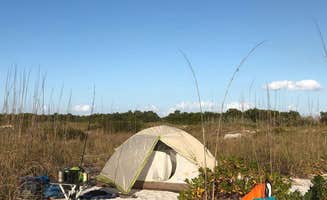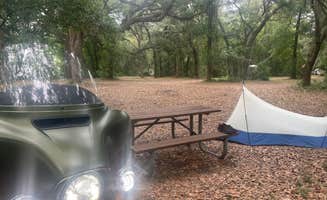Primitive camping near Parrish, Florida offers access to coastal islands, river banks, and inland forests within a subtropical climate zone that receives approximately 54 inches of rainfall annually. Most dispersed camping locations in this region have no facilities, making self-sufficiency essential. Water levels fluctuate seasonally, particularly affecting riverbank camping spots during Florida's rainy season from May through October.
What to do
Paddle to island campsites: Shell Key Preserve requires paddlers to cross approximately one mile of water between Summer Resort Key and Sister Key to reach camping areas. "Great spot for free camping (you do have to get the permit), and the best part is you can only get there by water! We paddled from Ft Desoto (one on kayak, other on paddleboard) with all of our gear roped on," reports Alyssa D. from Shell Key Preserve.
Wildlife observation: The coastal and river environments support diverse animal encounters. "We saw sting rays, a baby turtle, many different birds & other wildlife within 5 minutes of parking the boat," notes a camper at Shell Key. Inland areas offer different wildlife viewing opportunities throughout the year.
Shell collecting: The barrier islands provide opportunities for shell collecting at low tide. "This little island is fun if you're a boater wanting to hang out in the water or look for shells," mentions Kim S. about her experience on Shell Key.
What campers like
Secluded beachfront sites: The isolation of boat-in only camping creates privacy unavailable at developed campgrounds. "Shell key is a favorite local spot for my boyfriend and I. The greatest thing about camping here is that it's super cheap, secluded, and so beautiful. Sunsets are to die for," shares Alacyn B. from Peace River Banks Backcountry.
Minimal crowds at inland areas: Some water management areas remain uncrowded even when reservation systems show full capacity. "Didn't run into anyone eventhough permit page indicated Booked out," reports Nina O. from Upper Hillsborough Water Management Area.
Foraging opportunities: Some natural areas provide edible plants for experienced foragers. "Tons of edible flora, and fishing of course," notes a camper about the natural resources available at coastal camping areas.
What you should know
Terrain challenges: Undeveloped camping areas require careful site selection. "You do need to be mindful that there are lots of plants, shrubs, sticks and stones which can make being in a tent pretty rough if you don't have a good pad and a tarp to protect your tent," advises Elliott B. about primitive camping conditions.
Seasonal fire restrictions: Beach fires are regulated differently based on wildlife needs. "Campfires not permitted in summer months due to sea turtle nesting," reports a Shell Key camper, highlighting important seasonal limitations.
Variable facilities: Most dispersed camping areas have minimal or no facilities. "There is a porta-potty, but I didn't check it out, so I'm not sure about the cleanliness... and the lack of trash cans was surprising. Just take your trash with you, leave no trace," advises SukiDookie about St. Pete rest area (north).
Tips for camping with families
Short water crossings: For families with children, consider the distance when planning boat-in camping. "One of the easiest island paddles out there - just a little over a mile," explains Dan X., making Shell Key potentially accessible for families with paddling experience.
Weekend noise levels: Coastal camping areas near popular boating destinations experience varying noise levels. "The key is right across from South Beach at DeSoto so you're bound to hear some loud music from motor boats during the day, but it clears out and feels super remote by evening," notes a camper about sound conditions.
Site selection: For family comfort, seek out the limited cleared areas. "You can find some sandy spots tucked into the vegetation every so often along the beach, but you won't fit a large tent in these areas," advises a camper about space constraints at primitive sites.
Tips from RVers
Management area options: Some water management areas accommodate small to medium RVs despite being primitive. "Large open area with great shade trees, no water, privy. Easy pull through for RV," reports Scott O. about the Upper Hillsborough Water Management Area, noting that it is "Harley-Davidson approved" for those traveling with motorcycles.



